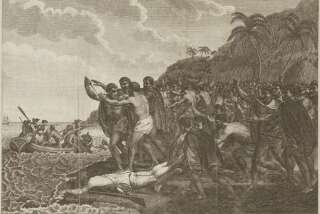God’s cold, dark waters
Exiles: A Novelby Ron Hansen(Farrar, Straus & Giroux: 228 pp., $23)
THE GREAT Sicilian mystery writer Leonardo Sciascia once quipped, “A man who dies tragically is, at any moment of his life, a man who will die tragically.” For the historical novelist, this is a potent proposal -- essentially, the dramatic key to a story in which the ending is predetermined and plot twists are not an option. In Ron Hansen’s novel “Exiles,” the dramatic inevitable belongs to the five drowned German nuns to whose memory the Victorian poet Gerard Manley Hopkins dedicated perhaps his most important work, “The Wreck of the Deutschland,” a poem that was neither understood during his lifetime nor terribly well-liked.
Returning to the religious territory of his acclaimed 1991 book, “Mariette in Ecstasy,” Hansen tells the story of the poet-turned-Jesuit seminarian so moved by news of the 1875 shipwreck that he breaks a seven-year abstinence from writing to compose a tribute. Hansen’s novel, like the poem it’s based on, takes up the dramatic scene aboard the Deutschland, a grisly, slow-motion sequence in which 157 people die from exposure, drowning or battering waves after the German steamship ran aground on a sandbar in the North Sea. “They fought with God’s cold -- / And they could not and fell to the deck / (Crushed them) or water (and drowned them) or rolled / With the sea-romp over the wreck.”
Interspersing the two narratives, Hansen begins with the nuns leaving behind their convent in northern Germany (a flight from anti-Catholic persecution under Chancellor Otto von Bismarck) on their way to a new life in America, giving each of their stories -- what they were like as girls, what brought them to their calling, and how they died, in Hopkins’ words, in “widow-making unchilding unfathering deeps.” We meet Hopkins where his fate joins theirs, the afternoon he reads of the wreck in a London newspaper. His superior at St. Beuno’s sees his exceptional distress and suggests that Hopkins write something.
Several years earlier, in service to his new religious vocation, Hopkins had destroyed all his poetry. The decision followed a tortured battle of which there is only a trace in his correspondence. Obliquely referred to by him as the “slaughter of the innocents,” the gesture was a renunciation of worldly pursuits. Thus, the rector’s invitation to write about the shipwreck constituted permission to engage again with the vocation he’d left behind.
The tremendous poem was met with tepid response. The esteemed editor of a Catholic monthly was baffled by it and passed it to a subeditor, who found it “barely readable.” Even Hopkins’ single most devoted reader, later editor of his complete works, Robert Bridges, characterized it as “presumptuous jugglery.” Doubting his own motives, Hopkins began recriminating himself for being disappointed. “The only just judge, the only just literary critic, is Christ.”
Surely, the double-strand enigma of creativity and faith drew Hansen to this subject. Hopkins, with his maverick genius and candid self-abnegation, is a fascinating character. He gave up poetry for religion. Gave up intimacy rather than face his sexuality. Gave up his social and intellectual position when he left the Anglican Church for cultish and out-of-favor Catholicism.
Hopkins did not die tragically -- he did die lonely and too young (at 44), and more than a little unfulfilled, not having achieved what he wanted with either his poetry or his priesthood. His death is more aptly described as miserable than dramatic. The conflicts that architected the poet’s life were interior, often passionate, and terrifically subtle. Animating those conflicts is Hansen’s challenge; yet the inherent obstacles of religious expression, combined with a profound respect for this historical figure, appear to dog the novelist. Hansen’s portrait seems to at once settle on and scurry from the mysteries of Hopkins’ mind. Take this exchange between Hopkins and a fellow seminarian:
“Smiling as he took the page from him, Hopkins seemed happy to have disappointed. ‘Oh, it’s a wreck this “Wreck.” My rhymes carry over from one line into another, and there’s a peculiar chiming inspired by Welsh poetry, and a great many more oddnesses that cannot but dismay an editor’s eye. I shan’t publish it. The journals will think it barbarous.’
“Splaine asked, ‘Why write it, then?’
“In puzzlement Hopkins replied, ‘Why pray?’ ”
Religious literature seldom shrinks from such questions. Yet Hansen shies away from penetrating too deeply into the emotional conflicts of these characters. Questions of faith seem to be articles of faith -- assumed but not posited or explored. This is especially true for the nuns, all the more surprising for they barely exist to history. Their temporal selves disappeared when they entered the church, then the real nuns evaporated among the casualties of the Deutschland. All we really have of them is their potent tragic death; the rest should be ripe for invention.
Hansen’s portraits are sincere and affectionate, but little more. Sister Barbara is tall and loves children; Aurea is petite and goofy. Henrica reads St. Ignatius and thinks, “Yes. Exactly” -- she’s the “smart one.” Brigitta is “the pretty one.” Poor, plain Norberta, with her “masculine name,” was an argumentative, imperious child who had trouble getting into the convent. They are an ensemble of noble ingenues -- candid, well-behaved, incurious. These happy-go-lucky nuns may in fact be representationally faithful -- a little stiff, a little dim, kindly and pious; perhaps quite settled in their vocation and slightly inured to the world outside -- but their collective lack of conflict seems alien to the fictional stage. They are at every moment women who die tragically -- and that seems to be their most significant feat of obedience.
Nuns are like disturbed geniuses or English public schoolboys -- stories about them are inherently salacious, covertly revealing, inexplicably narcissistic. Ex-nun Karen Armstrong remarks in a memoir how shocked she was the first time she saw a sister’s shoes under the long skirts -- she thought their feet never touched the earth. Hansen’s nuns neither walk nor float. Yet in the symbol of their tragic death, we have a quasi-martyrdom, a senseless accident, an act of God, even? What comfort does faith bring in death? That is perhaps religion’s essential mystery. One of Hopkins’ nuns dies, crying: “O Christ, Christ, come quickly.” One of Hansen’s nuns remembers “as she sank: Jesus wept.” The last nun to drown, Brigitta, prays on the words “our exile,” realizing that the sisters had been exiles “not from Germany, not from Europe, but from Paradise, from Heaven” -- but no longer. Death brings the end of exile.
With all that Hopkins sacrificed for his vocation, it is the exile of the German nuns that binds their fate to his: “Sister, a sister calling / A master, her master and mine! -- [ . . . ] Loathed for a love men knew in them, / Banned by the land of their birth, / Rhine refused them. Thames would ruin them.” The parallel stories of the nuns and the misunderstood priest-poet are rife with convictions -- beliefs about the order of the universe that lead to trouble. For beyond the comfort faith offers, there is the matter of what comfort -- what more than comfort -- faith brings that these characters choose it above all else.
From the magnificent words of Hopkins to the terrifying drama aboard the Deutschland, the promises of “Exiles” are superlative. The execution is tentative. If only Ron Hansen had plunged more deeply into those dark waters. If only a novel about fate, faith and poetry could give us more. *
More to Read
Sign up for our L.A. Times Plants newsletter
At the start of each month, get a roundup of upcoming plant-related activities and events in Southern California, along with links to tips and articles you may have missed.
You may occasionally receive promotional content from the Los Angeles Times.






